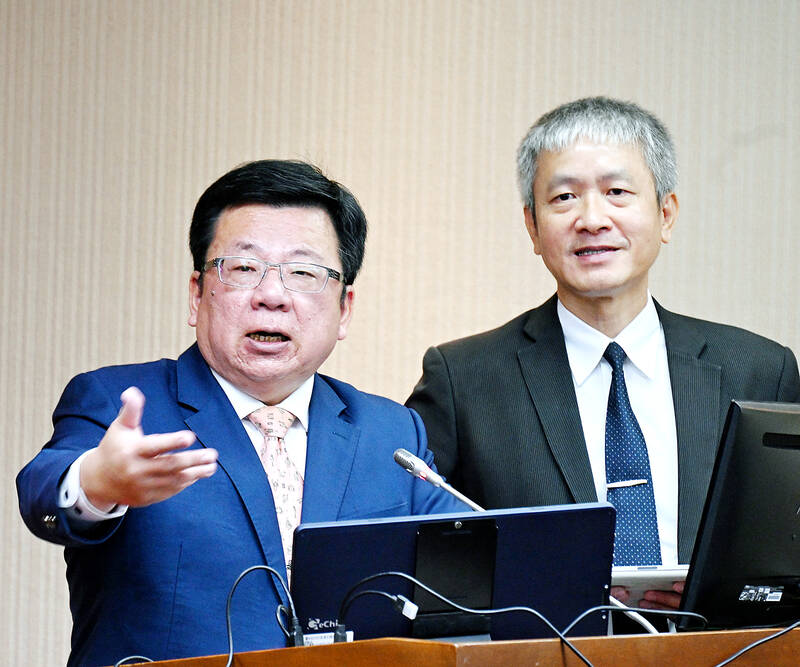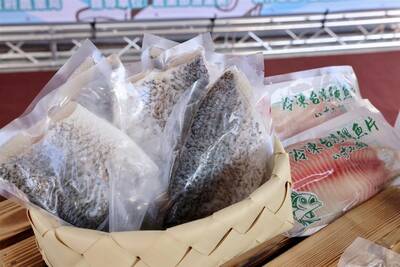Continued government subsidies are the “only way” to stabilize the Labor Insurance Fund in the absence of a consensus over how to proceed with the next stage of pension reform, Deputy Minister of Labor Lee Chun-yi (李俊俋) said on Wednesday.
Lee made the remarks during a meeting of the legislature’s Judiciary and Organic Laws and Statutes Committee when Chinese Nationalist Party (KMT) Legislator William Tseng (曾銘宗), accusing the Ministry of Labor of inaction, asked when it would put forth plans for Labor Insurance Fund reform.
Lee denied that the ministry had delayed the proposed reform, saying that employers, workers and experts disagree over how to proceed.

Photo: Fang Pin-chao, Taipei Times
The issue must be approached with caution, as it involves 10 million workers and 600,000 employers, but so far, “the parties involved are still a long way from a consensus,” Lee said.
At present, the only solution that employers and workers find acceptable to stabilize the fund is through continued government subsidies, Lee said.
In a written report submitted on Wednesday by the ministry to the legislative committee, it said that Taiwan’s low birthrate and aging population have put a strain on the fund.
Since 2020, the Cabinet has injected NT$147 billion (US$4.78 billion) to stabilize the fund, and earmarked an unprecedented NT$100 billion in subsidies for the fund for next fiscal year, the report said.
The ministry has previously proposed making “minor, but necessary” adjustments to the Labor Insurance Fund system to ensure its sustainability, which it hopes to review every five years.
Since its establishment in 1995 to February this year, the fund’s cumulative profit had reached NT$527.2 billion, with an average rate of return of 4.36 percent over the past 10 years, ministry data showed.
Despite concerns raised in some quarters over the fund’s sustainability, the ministry assured the public that its operations remain stable.
The fund totaled NT$753.4 billion at the end of last year, data released by the ministry in March showed.

Taiwan's Vice President Hsiao Bi-khim (蕭美琴) said Saturday that she would not be intimidated by the Chinese Communist Party (CCP), following reports that Chinese agents planned to ram her car during a visit to the Czech Republic last year. "I had a great visit to Prague & thank the Czech authorities for their hospitality & ensuring my safety," Hsiao said on social media platform X. "The CCP's unlawful activities will NOT intimidate me from voicing Taiwan's interests in the international community," she wrote. Hsiao visited the Czech Republic on March 18 last year as vice president-elect and met with Czech Senate leadership, including

There have been clear signs of Chinese Communist Party (CCP) attempts to interfere in the nationwide recall vote on July 26 in support of Chinese Nationalist Party (KMT) legislators facing recall, an unnamed government official said, warning about possible further actions. The CCP is actively involved in Taiwanese politics, and interference in the recall vote is to be expected, with multiple Chinese state media and TAO attempts to discredit the Democratic Progressive Party (DPP) and undermine public support of their recall movement, the official said. This interference includes a smear campaign initiated this month by a pro-Beijing Hong Kong news outlet against

A week-long exhibition on modern Tibetan history and the Dalai Lama’s global advocacy opened yesterday in Taipei, featuring quotes and artworks highlighting human rights and China’s ongoing repression of Tibetans, Hong Kongers and Uighurs. The exhibition, the first organized by the Human Rights Network for Tibet and Taiwan (HRNTT), is titled “From the Snowy Ridges to the Ocean of Wisdom.” “It would be impossible for Tibetans inside Tibet to hold an exhibition like this — we can do it. because we live in a free and democratic country,” HRNTT secretary-general Tashi Tsering said. Tashi Tsering, a Taiwan-based Tibetan who has never

A first shipment of five tons of Taiwan tilapia was sent from Tainan to Singapore on Wednesday, following an order valued at NT$600,000 (US$20,500) placed with a company in the city. The products, including frozen whole fish and pre- cooked fish belly, were dispatched from Jiangjun Fishing Harbor, where a new aquatic processing and logistics center is under construction. At the launch, Tainan Mayor Huang Wei-che (黃偉哲) called the move a “breakthrough,” marking Taiwan’s expansion into the Singaporean tilapia market. Taiwan’s tilapia exports have traditionally focused on the United States, Canada, and the Middle East, Huang said, adding that the new foothold in